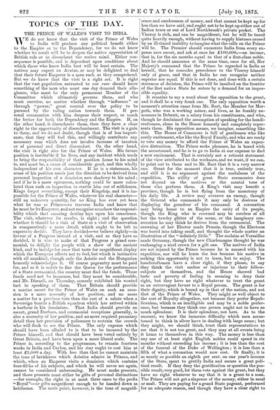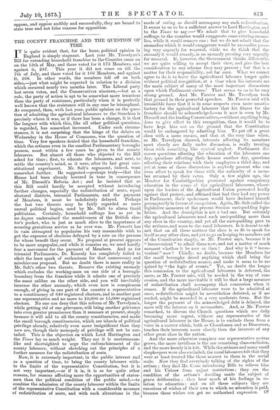TOPICS OF THE DAY.
THE PRINCE OF WALES'S VISIT TO INDIA.
WE do not know that the visit of the Prince of Wales to India will produce any political benefit either to the Empire or to the Dependency, for we do not know whether its result will be to deepen the native appreciation of British rule or to disenchant the native mind. Either con- sequence is possible, and is dependent upon conditions about which those who know India best will be least certain. The natives may expect an Avatar, or may be delighted to find that their future Emperor is a man such as they comprehend. But we do know that the visit is a right act. It is right that the vast population entrusted to our care should know something of the man who must one day demand their alle- giance, who must be the only permanent Member of the Committee which ultimately governs them, and who must exercise, no matter whether through "influence" or through "power," great control over the policy to be pursued by the ruling nation towards them. If per- sonal communion with him deepens their respect, so much the better for both the Dependency and the Empire. If, on the other hand, it disenchants them, then they have a clear right to the opportunity of disenchantment. The visit is a gain to them, and we do not doubt, though that is of less import- ance, that they will feel this, and willingly contribute any necessary sum which does not involve increase of taxation or of personal and direct discomfort. On the other hand, the visit is right also for the Prince of Wales. His future position is inevitable if he lives, and any incident which tends to bring the responsibility of that position home to his mind is, and must be, a cause of considerable good, and this wholly independent of his own character. If he is a statesman, his sense of his position needs just the direction to be derived from personal inspection of a dominion now shadowy to his mind ; and if he is a mere epicurean, nothing could be more calcu- lated than such an inspection to startle him out of selfishness. Kings forget everything, except their Kingship, and it is im- possible for the Prince of Wales, whatever his real character— still an unknown quantity, for no King has ever yet been what he was as Prince—to traverse India and know that he must be its Emperor, and not recognise somehow the responsi- bility which that amazing destiny lays upon his conscience. The visit, whatever its results, is right ; and the question whether it should be a visit of State or a visit of observation is comparatively a mere detail, which ought to be left to experts to decide. They have decided—we believe rightly—in favour of a Progress instead of a visit, and as they have so decided, it is wise to make of that Progress a grand cere- monial, to delight the people with a show of the ancient kind, and to indulge for once that taste for magnificent display which the European affects not to feel, but which is instinctive with all mankind, though only the Asiatic and the Hungarian honestly acknowledges it. Of course pageantry must be paid for, and as it is unfair to fine the Queen for the performance of a State ceremonial, the country must find the funds. Those funds need not be immense, but they must be considerable, and Mr. Disraeli, on Thursday, scarcely exhibited his wonted tact in speaking of them. That Britain should provide a marine escort for the Prince of Wales on such an occa- sion is a mere necessity of her position, and no more a matter for a previous vote than the cost of a salute when a Sovereign boards a British squadron which has arrived within a harbour in his dominions. That India should provide an escort, grand Durbars, and ceremonial receptions generally, is also a necessity of her position, and no more required pecuniary detail than her provision of policemen to restrain the crowds who will flock to see the Prince. The only expense which should have been alluded to is that to be incurred by the Prince himself, and that should have been voted entirely by Great Britain, and have been upon a more liberal scale. The Prince is according to the programme, to remain fourteen weeks in India and Ceylon, and his stay ought to cost him at least £1,000 a day. With less than that he cannot maintain the tone of lavishness which Asiatics admire in Princes, and which, when an Emperor visits a dominion which contains four-fifths of his subjects, and which he will never see again, cannot be considered unbecoming. He must make presents, and those presents must either be gifts of personal distinctions —for example, the right in at most three cases to the prefix "Royal"—or gifts magnificent enough to be handed down as heirlooms. The main point, however, is the tone of magnifi- cence and carelessness of money, and that cannot be kept up for less than we have said, and ought not to be kept up either out of Indian taxes or out of Lord Northbrook's private pocket. The Viceroy is rich, and can be magnificent, but he will be taxed quite heavily enough, without having to supply hiatuses caused by an ill-timed inability to imagine what the calls on the Prince will be. The Premier should exonerate India from every ex- pense save escort, and ask at once for £100,000,—an income, that is, for the six months equal to that of a first-class noble. And he should announce at the same time, once for all, Her Majesty's command that the Prince be regarded in India as herself, that he concedes precedence to the Viceroy himself only of grace, and that in India he can recognise neither superior nor equal. If this is not done, and done with a certain sternness of decision, the Prince will be insulted on the frontier of the first native State he enters by a demand for an impos- sible equality.
It remains to say a word about the opposition to the grant, and it shall be a very frank one. The only opposition worth a moment's attention came from Mr. Burt, the Member for Mor- peth, who was a working miner, and lives, as he frankly an- nounces in Debrett, on a salary from his constituents, and who, though he disclaimed the assumption of speaking for the handi- craftsmen, alone in the House honestly and completely repre- sents them. His opposition means, we imagine, something like this. The House of Commons is full of gentlemen who like costly excitement, who like the Royal Family, and who are ready to vote any money to afford the Prince of Wales an expen- sive distraction. The Prince seeks pleasure, he is bored with the accustomed, and he is to go to India at our expense to find a new excitement. That is certainly not a reticent statement of the view attributed to the workmen, and we want, if we can, to point out to them and to Mr. Burt that it is a very narrow one. Grant for the moment that it is true, entirely true,, and still it is no argument against the usefulness of the expedition. The utility of great State ceremonies does not depend on the motives or the mental tone of those who perform them. A King's visit may benefit a province, though he is but flying from the monotony of his daily life. A review may overawe an enemy, though the General who commands it may only be desirous of displaying the grandeur of his command. A coronation may bring home to an Empire the unity of its people, though the King who is crowned may be careless of all but the tawdry glitter of the scene, or the imaginary con- secration he may think he derives from the ceremonial. The crowning of her Elector made Prussia, though the Electress was bored into taking snuff, and thought the whole matter an illustration of the " infinitely little." The acclaim at Versailles. made Germany, though the new Charlemagne thought he was exchanging a steel crown for a gilt one. The natives of India, are not injured by the Prince because he is amused with his expedition, nor will he learn the less because his motive in seeking this opportunity is not to learn, but to enjoy. The handicraftsmen have a clear right, if they please, to say they think the visit useless or injurious to their fellow- subjects or themselves, and the House showed bad taste and poverty of feeling in seeming to deny their right, but they have no right whatever to treat the grant as an extravagant favour to a Royal person. The grant is for their dignity, which is bound up in that of the nation, and not that of the Prince of Wales. They might as well object to the cost of Royalty altogether, not because they prefer Repub- licanism, which is an intelligible and may be a noble prefer- ence, but because they think one person ought not to have so. much splendour. It is their splendour, not hers. As to the amount, we know the immense difficulty which men accus- tomed to think in silver have in dealing with large sums ; but they might, we should think, trust their representatives to. see that it is not too great, and they may at all events bring it home to themselves in this way. The money is less than any one of at least eight English nobles could spend in six months without exceeding his income ; it is less than the cost of the funeral of the Duke of Wellington ; it is less than a fifth of what a coronation would now cost. Or finally, it is as nearly as possible an eighth per cent. on one year's income of the State, spent to gratify India and secure a great poli- tical result. If they deny the gratification or question the pos- sible result, very good, let them vote against the grant, but they have no right whatever to say that it is a grant to a man. The Prince will not get a sixpence of the money, either in meal or malt. They are paying for a grand State pageant, performed for an adequate reason, and though they have a clear right to oppose, and oppose audibly and successfully, they are bound to state true and not false reasons for opposition.



































 Previous page
Previous page